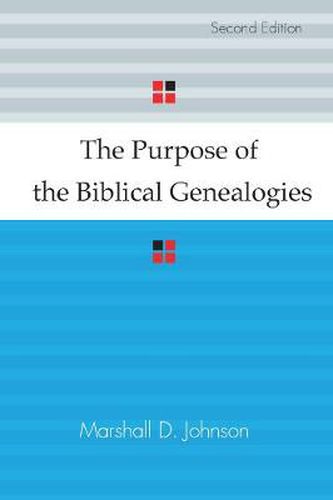Readings Newsletter
Become a Readings Member to make your shopping experience even easier.
Sign in or sign up for free!
You’re not far away from qualifying for FREE standard shipping within Australia
You’ve qualified for FREE standard shipping within Australia
The cart is loading…






Genealogical material occurs frequently in the Old Testament, and in the Gospels of Matthew and Luke as well as in later Jewish literature. What is the purpose of these lists? How do they relate to their historical and literary context, and what is their function in the Hebraic-Christian literary tradition? Dr. Johnson answers these questions in relation to contemporary biblical scholarship, and is concerned to show that such genealogies are not merely appendices to biblical narratives but are closely related to their context in language, structure and theology He attempts to assess the extent to which they reflect the views of the authors of the books or contexts into which they are placed. He also examines the transition of the genealogical form, and shows how its function changed from tribal expressions to the Gospel writers’ use of it to illustrate the conviction that Jesus is the fulfillment of the hope of Israel. Concerned as he is more with the literary purpose of this type of biblical literature than with the historical authenticity of various lists, Dr. Johnson examines a subject that is only now beginning to engage the attention of scholars generally.
$9.00 standard shipping within Australia
FREE standard shipping within Australia for orders over $100.00
Express & International shipping calculated at checkout
Genealogical material occurs frequently in the Old Testament, and in the Gospels of Matthew and Luke as well as in later Jewish literature. What is the purpose of these lists? How do they relate to their historical and literary context, and what is their function in the Hebraic-Christian literary tradition? Dr. Johnson answers these questions in relation to contemporary biblical scholarship, and is concerned to show that such genealogies are not merely appendices to biblical narratives but are closely related to their context in language, structure and theology He attempts to assess the extent to which they reflect the views of the authors of the books or contexts into which they are placed. He also examines the transition of the genealogical form, and shows how its function changed from tribal expressions to the Gospel writers’ use of it to illustrate the conviction that Jesus is the fulfillment of the hope of Israel. Concerned as he is more with the literary purpose of this type of biblical literature than with the historical authenticity of various lists, Dr. Johnson examines a subject that is only now beginning to engage the attention of scholars generally.